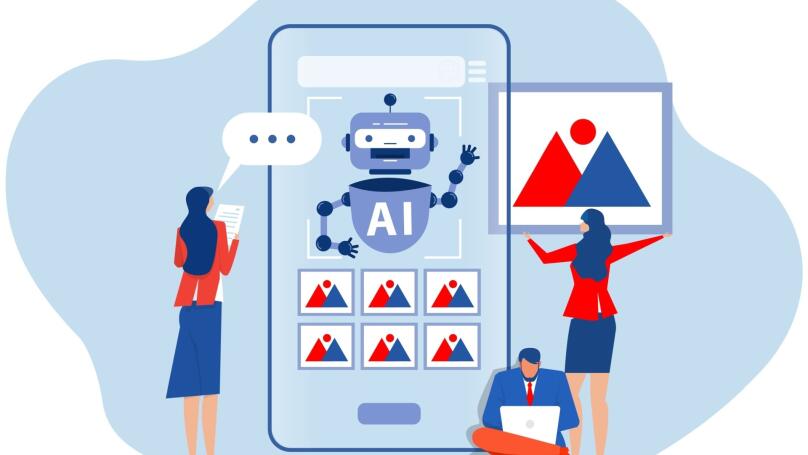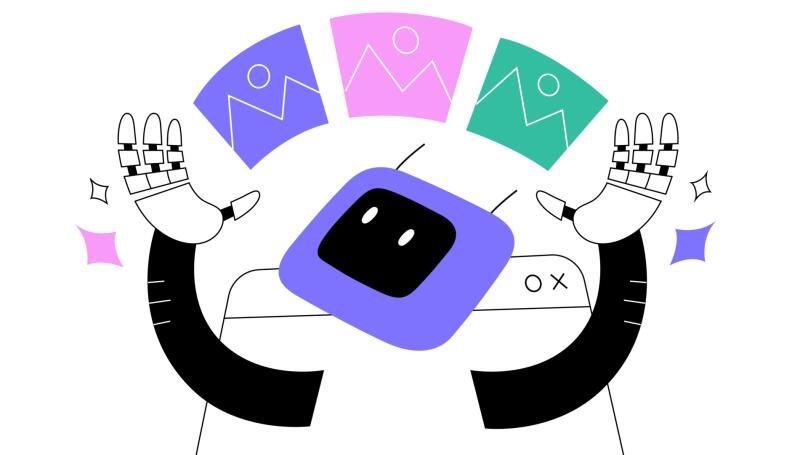Specialists and other Professions that AI (Artificial Intelligence) has Spawned
With the emergence and development of Artificial Intelligence, world experts prophesy that most professions will soon disappear due to elementary uselessness.

I'm sure you'll agree that AI technologies have evolved significantly over the past few years and have found application in all spheres of life. However, while neural networks take away jobs from some employees, they open new career opportunities and prospects for others. Let's find out who an AI specialist is and what other professions have emerged along with Artificial Intelligence.
An AI Specialist
Despite the widespread belief that neural networks are about to take over the world and surpass you and me, humans, AI specialists, continue playing a crucial role in creating and developing artificial intelligence. They are engaged in developing and applying intelligent computer systems for various spheres of activity, such as designing educational chatbots. In other words, this is the broadest profession related to Artificial Intelligence because AI specialists can be engaged in research work and developing practical applications.
In their work, they develop unique algorithms to train Artificial Intelligence to recognize certain information in various formats, such as text, audio, video, ciphers, and codes. Additionally, AI specialists work with databases, develop software, and engage in machine learning of neural networks and model testing. Their work allows them to automate specific work processes and production, optimize work, simplify various tasks, and improve the quality of service. All this contributes to the improvement of certain spheres of human life. That is why the profession has been in demand in recent years. For example, in America, according to the Bureau of Labour Statistics, the salary of representatives of this specialty is about $100-150,000 a year. More experienced workers can earn more than $250,000.
First, you must get a professional education to earn such an income. The best in Artificial Intelligence, modern technologies, and big data are the Massachusetts Institute of Technology, Carnegie Mellon University, the University of California at Berkeley, and, of course, Harvard, Stanford, and Oxford Universities, which offer separate faculties and structural units of computer science and IT, robotics, and AI systems.
However, in addition to a vocational diploma, it is necessary to:
- Be proficient in several programming languages.
- Know NLP (Natural Language Processing).
- Understand statistics, algebra, calculus, and other mathematical sciences.
- Be able to analyze information comprehensively.
An AI professional is one of the most promising professions because AI capabilities are utilized in every field of activity. Artificial Intelligence professionals will be in demand in various industries, from finance and investment to medicine, logistics, industry, and IT and communications.
AI Prompt Engineer

After an AI specialist creates a new Artificial Intelligence system, it is handed over to a prompt engineer. They are the ones who can improve and enhance it.
A Prompt-Engineer or Prompter tests requests and maintains the prompt database. It is the name of particular text tasks or codes given to AI for step-by-step correction. As a result, thanks to such prompts or prompts, a particular product, whether text, image, video, or program code, can be obtained as closely as possible to the specifications set by the user. In other words, a prompt engineer can competently and correctly formulate a request to this or that neural network to get the necessary information in the most attractive form.
Thus, the essence of the profession is to receive technical tasks and requests from user-customers, turn them into prompts, and process the results obtained from the neural network. According to the U.S. Job Bureau, employees who improve and enhance neural networks make more than $90,000 annually. However, to become a professional in this field, you must:
- Be able to write competent instructions for large language models.
- Know the principles and peculiarities of their work.
- Master several programming languages.
- Be able to work with big data and master data science.
Simultaneously, a prompt engineer creates and optimizes all the processes specific neural networks can perform. He or she trains them, adjusts their parameters, and can also participate in developing and testing new products. Such a wide range of tasks and competencies allows prompt engineers to remain in demand despite the emergence of many new professions related to Artificial Intelligence.
An AI Trainer
Neural networks generate answers to hundreds of thousands of user queries daily, asking users to solve a maths problem, develop an idea for a themed party, write a text for an email newsletter, create a convenient route, etc. The AI Trainer should monitor and improve the quality of answers to these questions daily.
Together with an engineer or a developer, this specialist trains the artificial intelligence to respond competently to user queries, give relevant and appropriate answers, and reproduce information like a live person would. In other words, the AI trainer's task is to teach the neural network to answer any question as well as a person who understands the given topic.
You can compare the profession of an AI trainer to that of a prompt engineer. However, suppose a prompter can optimize and correct the artificial intelligence system and all the processes under its control. In that case, the AI coach's tasks include mainly evaluating texts generated by the neural network, improving them, editing them, and verifying the facts' authenticity.
However, a neural network trainer should have no less competencies and knowledge than a prompt engineer. Namely:
- Be able to analyze large data sets.
- Have competent written speech and knowledge of foreign languages.
- Be able to understand unfamiliar topics quickly.
- Have fact-checking and editing skills.
That's why people from humanitarian professions, such as journalists, copywriters, writers, and editors, can succeed in AI-related professions. Moreover, the average salary of an AI trainer can range from $90,000 to $120,000 per year.
An NLP-Specialist

It is the name of an Artificial Intelligence professional engaged in processing natural, i.e., non-machine language. It specializes directly in using neural networks to work with textual information. For example, an NLP specialist designs and develops AI-based models for automatic translation of textual data. They design neural networks that can autonomously generate text at the user's request.
Thus, the main tasks of NLP trainers include training neural networks in:
- Speech recognition.
- Automatic translations into different world languages.
- Generate responses to queries in chatbots.
- Determine moods and intentions in text and voice messages.
- Automated transcription of audio messages.
NLP requires knowledge of the basics of natural language processing, so it is not uncommon for linguists to be employed in this profession. Additionally, the ability to apply machine learning algorithms to solve NLP tasks and knowledge of programming languages and frameworks necessary for working with neural networks is equally important. All the previously listed skills will be an advantage, such as the ability to work with and analyze large amounts of data and knowledge of statistics and probability theory basics.
According to recent figures, NLP specialists can earn between $100,000 and $150,000, depending on experience and location. More and more such jobs are opening up now, as natural language processing remains one of Artificial Intelligence's most actively developing areas.
Lectera’s Online Courses by topic
AI Ethicist
This profession is one of the newest in the technology field. An AI ethicist deals with issues related to the ethical aspects of developing and applying neural networks, ensuring they are used safely and environmentally friendly. To do this, the ethics officer researches, develops, and implements norms and principles for working with AI to monitor and regulate its operation.
The tasks of an ethics officer also include:
- Risk Assessment: they analyze the possible risks and negative consequences of using AI systems and propose measures to minimize them. For example, AI ethicists research the impact of automated systems on job cuts. They also regularly analyze how AI can lead to discrimination against certain groups of people;
- Developing Ethical Principles and Standards: these professionals help establish ethical standards to be observed in developing and applying AI systems. They may also be involved in developing IT company policies and guidelines for the ethical use of AI;
- Training and Education: AI ethicists train and educate other professionals and ordinary users about the importance of ethical aspects of AI and how to apply these principles in their work. They may conduct training, seminars, and webinars and develop educational materials. In addition, their duties include mandatory counseling of system developers to prevent potential out-of-the-box situations.
The ideal candidate for the position of an AI ethicist will be someone with two higher education degrees - humanities and technical. It is because the employee needs not only knowledge of the basics of artificial intelligence and machine learning, the principles of various AI algorithms and systems, but also an understanding of the ethical and social aspects of technology development, the ability to analyze and assess risks, as well as the ability to train, advise and warn other specialists.
Despite this wide range of tasks, the salary for such a specialist varies from $50,000 to $150,000 per year.
Product Manager

An AI product manager is responsible for developing, implementing, managing, and supporting AI-based products and services. He also plays a crucial role in ensuring the successful development and commercialization of inventions using AI technologies. The AI Product Manager works closely with developers, designers, marketers, and other staff to create products that solve real user problems and can improve their lives.
The AI product manager's responsibilities also include:
- Identifying User Needs and Interests. The manager conducts market research, analyses trends and audience needs to determine which product or service will be most in demand;
- Product Design and Development. The specialist participates in developing the product architecture, selecting AI technologies and algorithms, determining data requirements, and other technical aspects of the system.
- Team Management. In some cases, the manager may lead a team of developers, designers, and other specialists, coordinate their work, and ensure the timely completion of tasks.
- Testing and Optimising the Product. The manager monitors the quality of the product, tests and optimizes algorithms, and analyses the results to improve the product.
- Marketing and Promotion. It develops strategies to market the product, identifies the target audience, selects communication channels, and plans advertising campaigns.
- User Support. The manager supports product users, solves problems that arise, and answers questions.
A professional AI product manager must have product and project management skills, be familiar with current trends and technologies in the artificial intelligence market, and have technical expertise and knowledge of machine learning. This specialist earns between $200,000 and $600,000 per annum.
Thus, Artificial Intelligence has created new jobs, expanding the number of relevant and in-demand jobs in today's labor market. This proves the growing popularity of AI in almost all spheres of life. We are sure that neural networks will not stop there, and the future will bring even more exciting and unexpected professions that are attractive to those who want to change the world and contribute to the development of technology.
Share this with your friends via:
Latest News

In the UK, £23 million has been allocated for the expansion of the EdTech Testbed program — pilots of educational technologies in schools and colleges.

In the US, Tuskegee University announced the launch of Tuskegee University Global Campus (TUGC) — a new online platform for distance learning.

A significant stage in the development of the alternative education system has begun in West Northamptonshire in the UK: the County Council is actively calling on parents, guardians, and trustees to participate in shaping the future of this key area.

Outwoods Primary School in Atherstone, Warwickshire, having experienced deep sadness after the loss of their famous cat, Silla, has found solace in a new pet – a Maine Coon named Aloysius O’Hara.

In modern universities, artificial intelligence, and in particular ChatGPT, is rapidly transforming from a controversial tool into a full-fledged student assistant.












 £23 million allocated for the expansion of EdTech Testbed in the UK
£23 million allocated for the expansion of EdTech Testbed in the UK
 Tuskegee University launches Global Campus — a new online platform
Tuskegee University launches Global Campus — a new online platform
 Test: How Psychologically Mature Are You? Check Your Inner Foundation.
Test: How Psychologically Mature Are You? Check Your Inner Foundation.
 Test. Check Your Social Media Dependency Level!
Test. Check Your Social Media Dependency Level!
 Test: What Business is Right For You?
Test: What Business is Right For You?
 Test: How Prone Are You to Abusive Behavior as a Manager?
Test: How Prone Are You to Abusive Behavior as a Manager?
